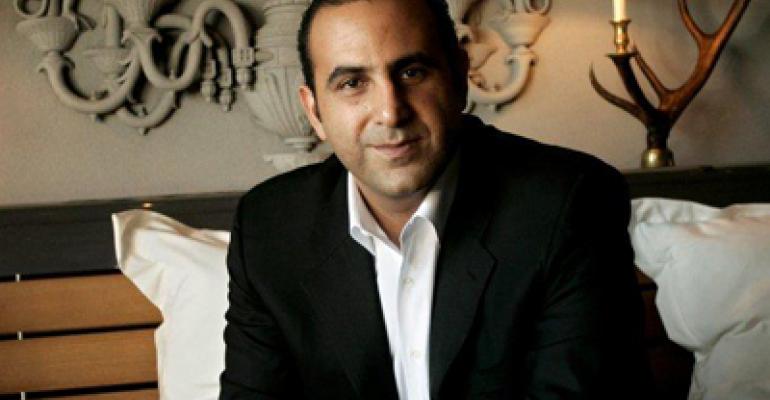As it approaches its 10-year anniversary next year, Los Angeles-based SBE is emerging as a deep-pocketed and diverse multi-concept operator of restaurants, hotels and nightclubs across the country.
Founder, chairman and chief executive Sam Nazarian has assembled a mushrooming collection of concepts, from José Andrés’ restaurant The Bazaar in Beverly Hills, Calif., to the first West Coast franchise operation of New York hot dog icon Papaya King.
Currently, SBE is taking its five-unit, upscale-casual Asian restaurant Katsuya national, with up to 20 locations planned for the next five years. And earlier this year, the company became an equal partner in Adam Fleischman’s five-unit Umami Burger.
Nazarian spoke with Nation’s Restaurant News about re-invention and the perils of sitting stagnant in the restaurant business.
 What does your partnership with Adam Fleischman [pictured left] and Umami Burger bring to SBE?
What does your partnership with Adam Fleischman [pictured left] and Umami Burger bring to SBE?
It will be a separate entity, a separate company. But we have committed the equity and are very excited about Adam as a brand and Umami as a brand.
The difficulty in our business is that lightning in a bottle is very hard to catch. And what Adam has been able to do with Umami is to create a brand that resonates in a space that’s very crowded, and also to create scalability. With our partnership, we can help guide a guy like Adam to go from five to 50 stores.
What is the goal for Umami Burger’s growth?
Our goal is to get to 60 [restaurants]. That’s a function of time, finding the right locations and the right markets. We have a healthy pipeline already. The response is tremendous.
It’s an emotional brand … It’s not necessarily white tablecloth, or how many Michelin stars you have. It’s the connectivity of the product with the end user.
Culinary awareness is at an all-time high. Shows like Top Chef have made it that much more a part of the culture today. You see people really wanting to know about their food, their wine, the eco-friendly buildings they’re in. They want to know about the designer, the inspiration. I did not see that when I was growing up.
What are your plans for Katsuya?
I think it could exist in any major urban center. We have four versions of it now that we think touch all different kinds of consumers. We could hit 15 to 20 units within the next four or five years, just domestically. We’re looking at international opportunities too, but it’s still too fresh of a brand to go international right now.
 Is The Bazaar restaurant in the SLS Hotel and your partnership with José Andrés growing?
Is The Bazaar restaurant in the SLS Hotel and your partnership with José Andrés growing?
Yes. SLS Miami opens in the first quarter next year and José is culinary director of the SLS brand.
One of the things we can be good at as a company is to be a really good platform for these amazing rock stars to flourish, whether it be an Adam, or a José or a Katsuya or Danny Elmaleh.
The restaurant space to me is a paradigm right now. Anybody today who says they know what will happen 10 years from now doesn’t know what they’re saying. This is an ever-changing business. You have to take risks. You can’t cookie-cutter anymore.
I think the institutional companies are at a big disadvantage to the companies willing to take risks. At a time of economic uncertainty, this is the best time to take risks. You’re taking risks when most people aren’t, and that’s what we’ve been able to do.
Continued from page 1
Tell me about your new concept, Mercato di Vetro.
At Mercato, for the first time that I’ve seen within a 4,000- to 5,000-square-foot restaurant, we’re putting the kitchen in the middle of the restaurant, where everything from the entrecote, to the mozzarella and salamis, to the pasta is being made.
Everybody comes in and you sit around and watch these “performers,” or chefs, and you see what you want to order. If you like it, you take it home. It’s a very simple philosophy.
 What are your plans as the first franchisee of Papaya King in Los Angeles?
What are your plans as the first franchisee of Papaya King in Los Angeles?
It’s a brand with unbelievable history and connectivity to a lot of people. A lot of people have tried to replicate it in New York. It has so much brand equity. It’s a specific experience of a juice and a hot dog cooked in a specific way with specific integrity. From Babe Ruth, to Julia Child to Martha Stewart, you name it, everyone’s eaten there.
We’ve talked about doing six or seven a year for the next three or four years.
What’s next for SBE?
It’s not something new, but it’s an evolution. I’m obsessed with communicating with clientele in the way they want to be communicated with. That, to me, is a game changer. The shotgun approach of advertising and blast emails and how to put butts in seats is so archaic.
The people that are doing it right are smaller operators with 20,000 followers on Twitter. The new aspect of SBE is culturally changing the process internally of embracing technology and at the same time maintaining originality. It’s working with social media and our marketing department, asking them to forget everything they’ve learned and to listen to the customer.
VIDEO : Sam Nazarian on CNN International
Contact Lisa Jennings at [email protected].
Follow her on Twitter: @livetodineout




